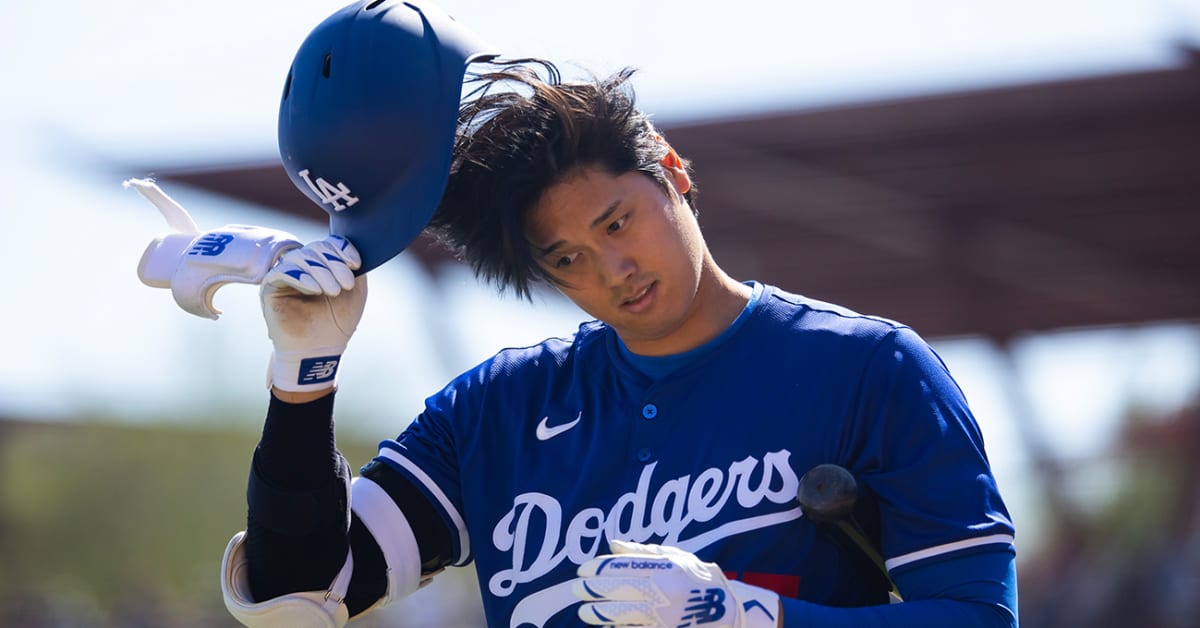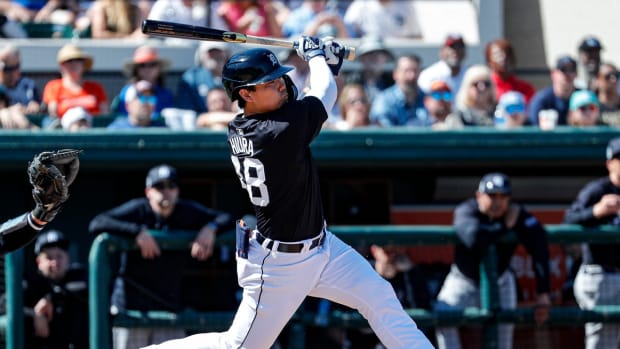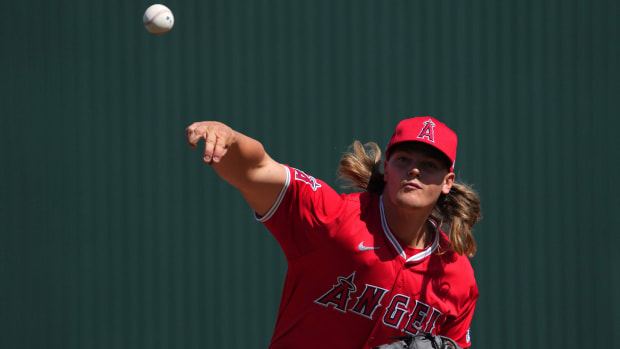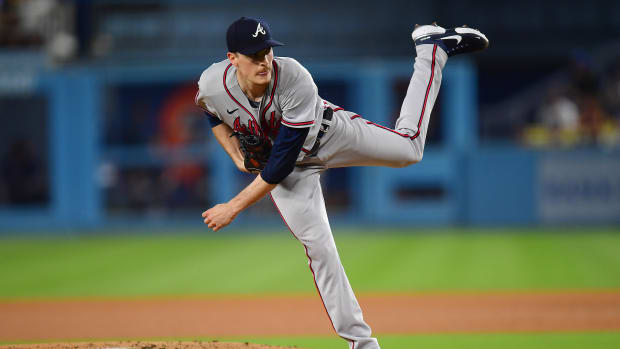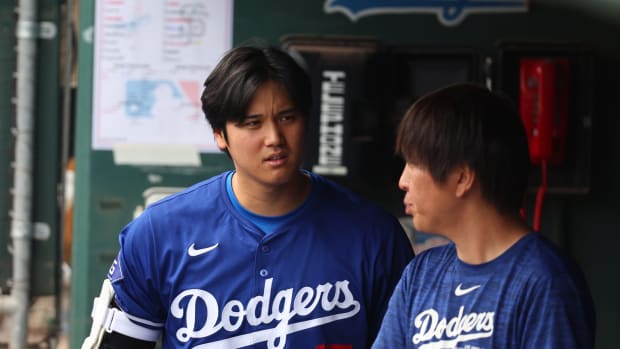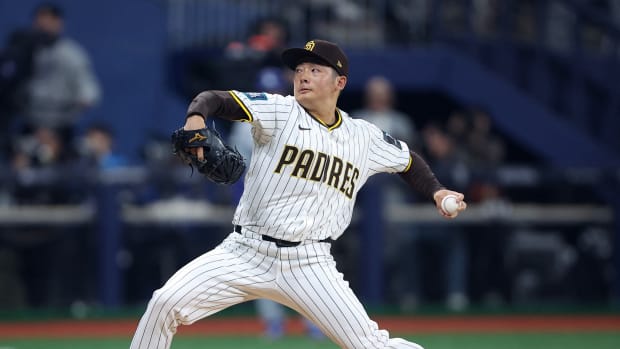Shohei Ohtani Strives to Be the Absolute Best … Even at Getting Some Shuteye
When Chris Winter, a neurologist and sleep expert, strolled into the Los Angeles Dodgers clubhouse at Camelback Ranch in Glendale, Ariz., this week to help them prepare for their season-opening trip to Seoul, he met with a receptive audience. Los Angeles had begun planning for the series long before MLB made the announcement eight months ago, and had already taken such steps as asking the team hotel to adjust the lighting in the lobby to reflect the time of day the club is trying to mimic.
So the front office and coaching staff had bought into taking steps to mitigate the 16-hour time difference. But Winter has worked with some 20 MLB teams over the years, plus a dozen teams in other sports, and what he has come to learn is that he can only say so much. Eventually what matters is who is listening.
“As soon as you have the leader of the team carrying their mattress around the country or whatever,” he says, emphasizing that he is speaking generally and not about any particular player, “it changes everything.”

Ohtani’s sleep optimization includes bringing his own mattress on road trips.
Mark J. Rebilas/USA TODAY Sports
Well, that’s good news for Winter, because the Dodgers’ best player does exactly that. Two-way star, new Dodger and $700 million man Shohei Ohtani has long focused on maintaining good sleep habits; in 2022 he told Japanese news agency Kyodo News, “Sleep is my top priority.” He tries to get 10 hours at night, plus a two-hour nap before a game.
“Everything he does is for a purpose,” says his new manager, Dave Roberts. “There’s no wasted time, on anything.”
During his five years starring for the Nippon-Ham Fighters in his native Japan, Ohtani learned about the Nishikawa mattress brand; in 2017, the year before he joined the Los Angeles Angels, he agreed to a sponsorship deal with the company. He quickly became its most famous spokesperson, participating in multiple ad campaigns about how seriously he takes his sleep. He currently uses a $3,000 AiR SX model, the company’s highest-end product, for which he was measured with a 3D body scan. As of last year, Nishikawa had gathered more than 1.2 million data points on Ohtani.
Japanese mattresses are much thinner than their American counterparts—between three and four inches thick—and this one, the medium firm model, comes in black and red. (“Like Angels colors!” says Maho Shibata, a spokesperson for Nishikawa.) Ohtani, 29, was also fitted for a custom pillow, which because of his broad shoulders is twice as firm as the average person’s. Ohtani, whom the Dodgers did not make available for an interview for this story, has said he rarely wakes up with a stiff neck.
“It’s something we should probably all do,” says Angels pitcher Kenny Rosenberg. Then, sensing an opportunity for his own sponsorship deal, he grins and adds, “I have a Purple Pillow at home. Shameless plug. They’re awesome pillows.”
But many athletes have optimized their sleep at home. Where Ohtani stands apart is in his effort on the road. Winter recommends athletes try to “create an illusion that you’re always home and you’re always in a comfortable sleep environment,” sometimes going so far as to bring their partner’s pillowcase to a hotel to retain their scent. It’s hard to do much about the mattress, though—unless you are Ohtani.
Nishikawa also makes a portable mattress, and Ohtani brings it with him on road trips. (Well, it would perhaps be more accurate to say his team’s traveling secretary brings it on road trips.) The whole thing folds down to about the size of a briefcase, then opens to become nearly as formidable as Ohtani’s regular mattress. At home, he uses the mattress right on a bed frame; on the road, he uses it as a mattress topper on hotel beds.
Because staffers are in charge of it, teammates don’t see Ohtani carrying it around, but word did eventually spread among the Angels. “I found out, and I laughed a lot,” says reliever Carlos Estévez. “I was like, I didn’t know you can do that!” (The Dodgers still have a lot to learn: “I don’t know anything about Ohtani except that he’s good at baseball,” says second baseman Mookie Betts.)
All teams incorporate some level of sleep science into their programs, but Ohtani is unusual even among his peers. He is also unusual among his countrymen. A 2021 survey conducted by the Organization for Economic Cooperation and Development found that Japanese people average seven hours and 22 minutes of sleep per day, the least among citizens of any of the 33 countries it measured. But that may be changing: The Sankei Shimbun, one of the top newspapers in Japan, reported last year that “the Ohtani effect is immeasurable,” causing legions of Japanese youth athletes to ask to go to bed early.
In a video Ohtani recorded for Nishikawa last year (below), he said he does not have a complicated bedtime routine (“I just fall asleep when I get sleepy”), and he does not use an alarm to wake up. He tries to wear a weighted sleep mask when he travels—such as on the 14-hour flight to South Korea, and the 12-hour flight back.
Left off the travel roster for the series was Dekopin, Ohtani’s Nederlandse Kooikerhondje. But don’t feel too bad for him. Ohtani mentioned to Nishikawa officials how much his pup loves their shared mattress, so this winter, Nishikawa sent a gift to its favorite sleep-conscious dog lover: a custom dog bed.






























